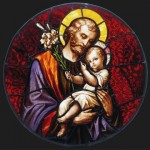by Fr. Patrick Henry Reardon
 The moment of the Incarnation was not static. To be a living human being is not a static thing. Strictly speaking, the doctrine of the Incarnation does not refer simply to a state, but to a full human life. The Word became a specific human being. This is why St. Cyril of Alexandria—manifestly the standard bearer of orthodox Christology—often spoke of Christ as “one of us” (heis ex hemon).
The moment of the Incarnation was not static. To be a living human being is not a static thing. Strictly speaking, the doctrine of the Incarnation does not refer simply to a state, but to a full human life. The Word became a specific human being. This is why St. Cyril of Alexandria—manifestly the standard bearer of orthodox Christology—often spoke of Christ as “one of us” (heis ex hemon).
As one of us, Jesus was raised in a real family. There was a man in that house that He addressed as abba, “father.” Jesus’ family bore Joseph’s name. In every way except biology, Joseph was Jesus’ father. Joseph loved and taught Jesus as his own son. Any “adopting father” understands this.
Indeed, the Gospel evidence suggests that Jesus was Joseph’s only son. Salva reverentia to a theory popular among the Greek Fathers, the Bible never refers to any of Jesus’ “brothers” as Joseph’s sons.
Although Matthew and Luke testified that Jesus was not the biological descendant of Joseph, it was through Joseph that they traced His family lineage (Matthew 1:16; Luke 3:23-31). Thus, Jesus inherited the messianic title “Son of David,” not from Mary, but from the man who served Him—literally—in loco parentis.
Jesus “was supposed” (enomizeto—Luke 3:23) to be “the son of Joseph,” Jeshua Bar Joseph (John 1:45; 6:42). When Jesus first addressed the citizens of Nazareth, those in the synagogue inquired,
“Is this not Joseph’s son?” (Luke 4:22)
There was also an instructive variation on this question:
“Is this not the carpenter’s son?” (Matthew 13:55)
The underlying Greek noun here, usually translated as “carpenter,” is tekton, a term including any sort of builder, craftsman, or skilled worker-even a blacksmith. A tekton was anyone who used tools to construct and fashion things with his hands.
In short, Joseph taught Jesus those cultivated talents summarized by George Eliot as the inheritance bequeathed from a working father:
“the mechanical instinct, the keen sensibility to harmony, the unconscious skill of the modeling hand” (Adam Bede, ch. 4).
Joseph passed these technical skills on to Jesus, who was also known as a tekton. A tekton was a man with talented hands, and Jesus’ hands could heal the sick and injured! Thus, Mark surely recognized the irony of calling Jesus a tekton in the context of His miracles and teaching!
“And what wisdom is this which is given to Him, that such mighty works are performed by His hands. Is this not the tekton” (Mark 6:2-3 emphasis added).
What more did Jesus learn from Joseph? Let me suggest that He also found in Joseph an ideal son of Abraham—that is to say, a man who lived, as Abraham did, following God by faith. Consider the calling of Joseph. Every vocation is unique—in the sense that the Good Shepherd calls each of His sheep by its own proper name—but there was something supremely unique in the vocation of Joseph, who was called to be the foster-father of God’s Son and the protector of that divine Son’s virgin mother.
Joseph’s vocation was not only difficult; it was impossible! In a sense, Joseph had to figure it out as he went along, simply following God’s call, as best he could, wherever it led. He was obliged to “leave the heavy lifting” to God.
With so distinctive and demanding a vocation, Joseph might be excused, surely, if, on occasion—the flight into Egypt, say—he felt anxious and insecure. The evidence, however, indicates that this was not the case. Joseph was not a man given to anxiety. He appeared, rather, as a person of extraordinary serenity. Four times Joseph appears on the scene in the Gospel of Matthew, and every single time he is sound asleep. Whatever trials Joseph endured, they apparently did not include insomnia.
Perhaps we see the influence of Joseph—particularly the example of his serenity and simple trust God—when we contemplate a later scene in the life of Jesus:
“Now when they had left the multitude, they took [Jesus] along in the boat as He was. And other little boats were also with Him. And a great windstorm arose, and the waves beat into the boat, so that it was already filling. But He was in the stern, asleep on a pillow” (Mark 4:36-38).
